Hyaluronic acid and vitamin C can be a great combo to help you achieve hydrated, glowy, healthy skin and a more even and uniform complexion.
Therefore, combining them in a routine has its benefits and a few potential drawbacks you should be aware of before incorporating this powerful duo into your regimen.
Which is why in this article, I will explain how to use hyaluronic acid and vitamin C together and avoid potential side effects that could arise from using these ingredients in the wrong way.
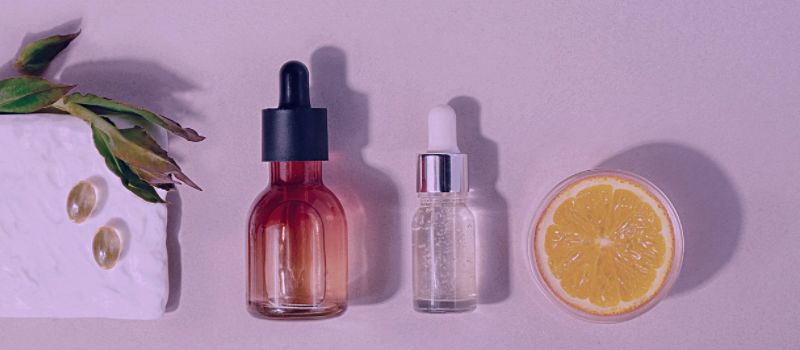
How Does Hyaluronic Acid Work?
Hyaluronic acid is a substance that naturally occurs in the human body. It can be found all over our bodies, especially around skin cells and less so inside cells.
In fact, hyaluronic acid makes up about 50% of all glycosaminoglycans (GAGs), which are large molecules known as polysaccharides that deal with the support and maintenance of structural proteins such as collagen and elastin.
From all this, we can tell that hyaluronic acid plays an essential role in healthy-looking skin by holding moisture within its structure that maintains smoothness and elasticity.
Therefore, the benefits of using hyaluronic acid in your skincare routine are many.
Hyaluronic acid helps hydrate the skin, making it look healthy and glowy. It also strengthens the skin barrier and helps it carry out other vital functions, such as defending itself from pathogens.
Additionally, hyaluronic acid can temporarily reduce fine lines and wrinkles by making the skin look plumper and smoother.
It also has some anti-inflammatory properties, and it’s non-comedogenic, meaning it won’t clog the pores, which makes it beneficial for anyone dealing with acne.
How Does Vitamin C Work?
An absolute favorite and loved by everyone, vitamin C is an ingredient that’s probably the most studied and recommended antioxidant on the market.
An antioxidant is a component that helps protect the cells from damage caused by free radicals, which are unstable molecules that cause damage to parts of cells such as proteins, DNA, and cell membranes by stealing their electrons through a process called oxidation.
When used topically, vitamin C has been observed to brighten the skin, even out the skin tone, reduce the appearance of fine lines and wrinkles, and reverse the damage done by the UV rays.
Vitamin C is also a pigment inhibitor that acts as a reducing agent at various oxidative steps of melanin formation, hence inhibiting melanogenesis, which is the process by which the brown pigment melanin is produced by melanocyte cells found in the deepest layer of the epidermis.
Lastly, vitamin C also has some anti-inflammatory properties and can help reduce redness and blemishes in some cases.
So from all this, we can tell that the benefits of using vitamin C in your skincare routine are many, and the most commonly observed ones include plumper and glowier skin, reduced inflammation, evened out uneven skin tone, evened out skin texture, reduced hyperpigmentation, and a more uniform complexion.
Benefits of Using Hyaluronic Acid and Vitamin C Together

Now that we know what each of these ingredients does and their benefits, let’s see what happens when we use them together.
When used together, hyaluronic acid and vitamin C can provide maximum hydration and antioxidant protection to the skin.
Hyaluronic acid will help attract and retain moisture in the skin, while vitamin C will help protect the skin from environmental stressors such as pollution and UV rays.
Additionally, combining these two ingredients can also help reduce the appearance of fine lines and wrinkles, brighten the skin, and even out the skin tone.
So, if you’re looking for a skincare routine that will provide maximum hydration and antioxidant protection, using hyaluronic acid and vitamin C together is a good option.
RELATED: Best Antioxidant Facial Serums
Risks of Using Hyaluronic Acid and Vitamin C Together
Hyaluronic acid and vitamin C can be great together; however, here are a few things you should watch out for when mixing these two ingredients:
Dryness
Dryness typically occurs when you don’t moisturize enough while using hyaluronic acid and vitamin C.
Hyaluronic acid is a hydrating ingredient; however, it works in a way where you have to follow it up with a thicker moisturizer that contains ingredients known as emollients.
If you don’t do this, hyaluronic acid will dry out the skin even more, which will lead to concerns such as inflammatory reactions and irritations.
Irritation
Irritation may occur when using both hyaluronic acid and vitamin C, and this can be due to several reasons:
- High concentrations of both actives.
- Overusing both actives.
- Using both actives with other strong actives such as retinoids, exfoliating acids, or acne medication.
- Not moisturizing enough.
- Not using sunscreen.
So try to avoid doing these things as they will help prevent irritation.
Breakouts
Random breakouts are another clear sign of irritation when using hyaluronic acid and vitamin C.
This usually means that you are using a high concentration of a product your skin doesn’t like, or you are using an oily product that is clogging up your pores and causing your skin to break out.
While hyaluronic acid is a non-comedogenic ingredient on its own and is typically found in lightweight serums, vitamin C tends to come in oilier formulations as this is what stabilizes the active.
So, if you are having issues with breakouts, vitamin C might not be the best active for you.
RELATED: Does Hyaluronic Acid Cause Purging?
Best Vitamin C Serums with Hyaluronic Acid
If you want a product that does it all, a good option would be a vitamin C serum which also contains hyaluronic acid.
This will give you the desired benefits of hydration and cell renewal without having to layer too many products and risking potential irritation due to other ingredients in the products.
Therefore, here are six excellent vitamin C serums with hyaluronic acid:
Yeouth – Vitamin C & E Serum
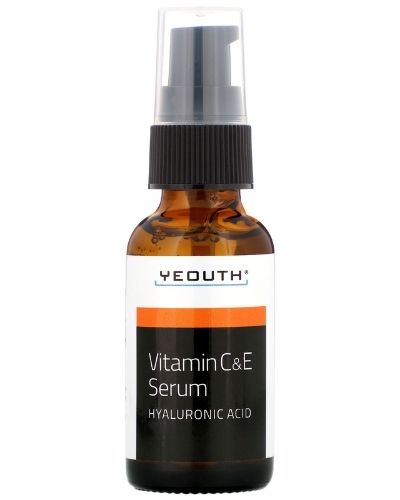
Best for normal, dry, mature, sun-damaged skin.
The Yeouth Vitamin C & E Serum is an affordable vitamin C serum that uses a stable form of vitamin C known as Magnesium Ascorbyl Phosphate, as well as hyaluronic acid to plump and hydrate the skin.
The product has the consistency of a clear gel-like serum, and it can be a little sticky when applied on fully dried skin, so a helpful tip is to use it on damp skin instead.
There is no smell, which is an excellent plus because vitamin C serums usually require a ton of fragrance and citrusy fragrant components to mask the raw ingredient that has a very unpleasant smell.
The only downside of this product is that it’s not easily available, so you do have do to a little bit of digging as to how you can get to it, depending on where you live.
TruSkin – Vitamin C Serum
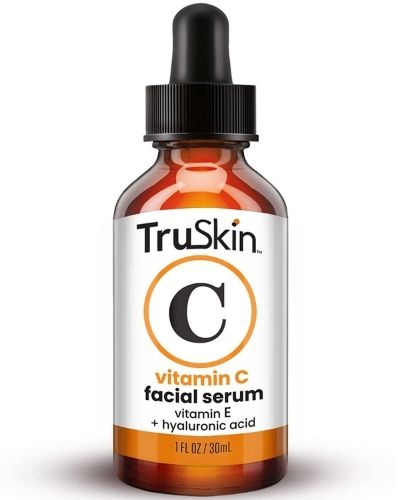
Best for normal, combo, oily, and acne-prone skin.
This vitamin C and hyaluronic acid combo serum by TruSkin has over 100,000 five-star ratings on Amazon and is frequently praised for its quick effectiveness and the results it provides after as little as one week of using it.
It’s also affordable and easy to find as it’s available on Amazon.
The TruSkin Vitamin C Serum has a lightweight consistency, making it perfect for those with oily skin as it won’t clog up your pores or cause breakouts.
It does have a slight citrusy smell; however, it’s not too overpowering, and it fades away shortly after applying the product.
The only downside is that it contains witch hazel, which might be drying for some people, but other than that, it’s a great product.
Naturium – Vitamin C Super Serum Plus
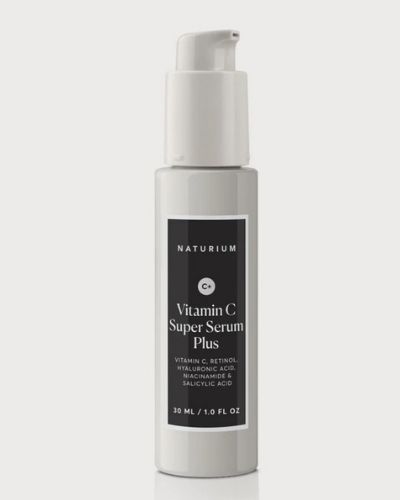
Best for all skin types.
Naturium’s Vitamin C Super Serum Plus combines three different actives to target multiple skin concerns, including damaged and dull skin, post-inflammatory hyperpigmentation, dark spots caused by UV damage, and skin texture.
The formula is supercharged with vitamin C, retinol, niacinamide, as well as hyaluronic, and salicylic acid, which helps to brighten, smooth, and clarify the skin.
It has a gel-cream-like consistency, and it’s lightweight, making it suitable even for those with oily skin and problematic skin.
The serum is also excellent for mature skin, as it helps reduce fine lines and wrinkles, as well as damage done from years of unprotected sun exposure and other environmental stressors.
Vichy – LiftActiv Vitamin C Brightening Skin Corrector
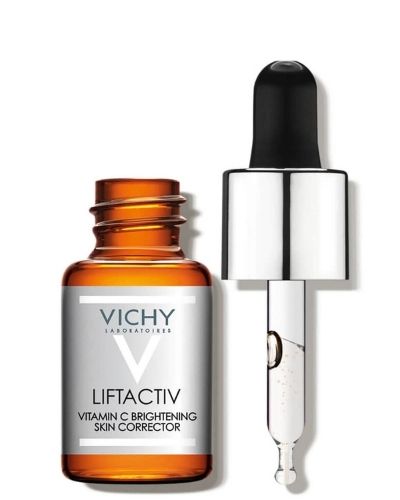
Best for oily, acne-prone skin.
Vichy’s LiftActiv Vitamin C Brightening Skin Corrector is one of the few vitamin C serums which are actually suitable for oily and acne-prone skin.
The serum contains 15% vitamin C to help brighten the complexion, improve uneven skin tone, and reduce the appearance of fine lines as its antioxidant properties protect the skin from environmental stress.
Additionally, the addition of pure hyaluronic works to plump the skin and visibly reduce fine lines and wrinkles.
Lastly, the lightweight, watery serum also contains Vichy’s proprietary Volcanic Water sourced from French volcanoes, which features fifteen essential minerals to help strengthen the skin’s barrier and protect skin from damaging environmental factors like UV rays and pollution.
The only drawback of this serum is that it contains alcohol denat; however, this shouldn’t be a problem for those with resilient, oily skin.
Eva Naturals – Vitamin C Plus Skin Clearing Serum
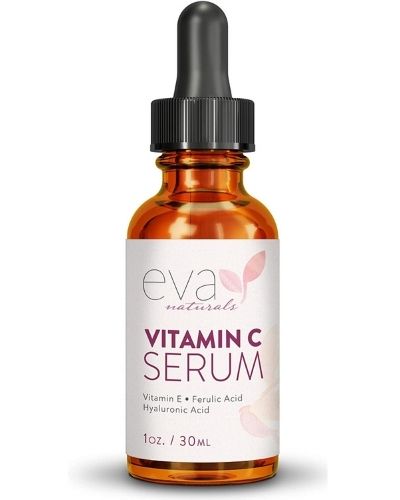
Best for dry, acne-prone skin.
The Eva Naturals Vitamin C Plus Skin Clearing Serum can be a good option for those who are dealing with dry skin and acne.
Although acne is typically an oily skin issue, it’s also not uncommon for those with dry skin.
So, while those with oily skin should definitely stay away from this product, those with dry skin will likely enjoy the softening benefits of squalane and rosehip oil, soothing Centella Asiatica, and hydrating hyaluronic acid.
The lightweight formula makes the Vitamin C Plus Skin Clearing Serum easy to absorb while leaving behind nothing but a beautiful glow.
Paula’s Choice – 10% Niacinamide Booster
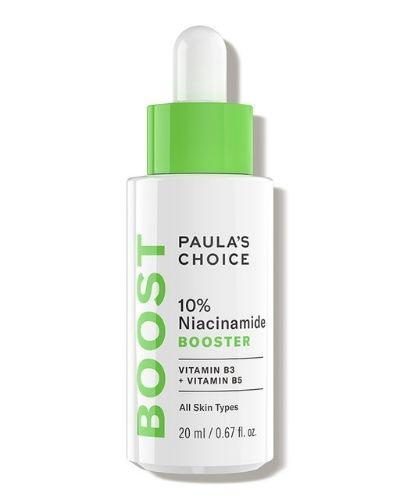
Best for all skin types.
Paula’s Choice 10% Niacinamide Booster is an excellent product for those looking to target multiple concerns with one product.
The combination of niacinamide and vitamin C will be effective in evening out the skin tone and reducing hyperpigmentation, while soothing licorice extract, panthenol, and allantoin will soften and nourish the skin, preventing irritation from occurring.
The addition of hyaluronic acid makes this booster even more powerful as it helps the skin retain moisture better.
Last but not least, the lightweight serum also contains a blend of potent antioxidants, such as genistein, carnosine, and ubiquinone, which work together to protect the skin from free radical damage and improve the overall appearance.

My name is Simone and I am a certified skin specialist. I created this website to teach my readers how to take great care of their skin and I also like to occasionally share my honest opinions on skincare products I’ve tried. You can learn more about me here.
